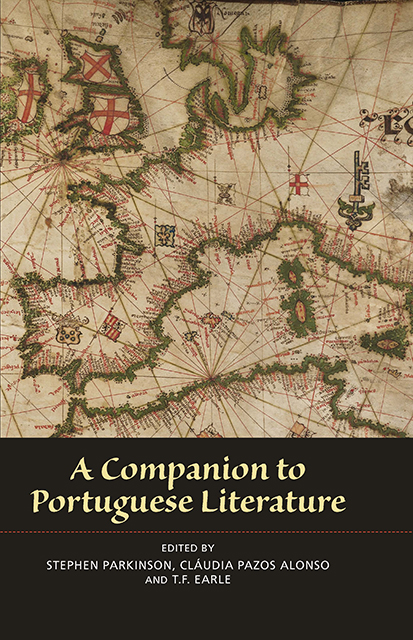Book contents
- Frontmatter
- Contents
- Acknowledgements
- Notes on the Contributors
- Introduction
- 1 Eight Centuries of Portuguese Literature: An Overview
- 2 The Medieval Galician-Portuguese Lyric
- 3 Fernão Lopes and Portuguese Prose Writing of the Middle Ages
- 4 Portuguese Theatre in the Sixteenth Century: Gil Vicente and António Ferreira
- 5 The Lusiads and the Literature of Portuguese Overseas Expansion
- 6 Lyric Poetry in the Sixteenth Century
- 7 The Seventeenth Century
- 8 The Eighteenth Century
- 9 Almeida Garrett: Founder of Modern Portuguese Literature
- 10 The Transition from Romanticism to Realism: Alexandre Herculano, Camilo Castelo Branco and Júlio Dinis
- 11 Eça de Queirós: A European Writer
- 12 Fernando Pessoa and the Modernist Generation
- 13 Narrative and Drama during the Dictatorship
- 14 Women Writers up to 1974
- 15 Writing after the Dictatorship
- 16 Portuguese Literature in English Translation
- Index
7 - The Seventeenth Century
Published online by Cambridge University Press: 03 March 2023
- Frontmatter
- Contents
- Acknowledgements
- Notes on the Contributors
- Introduction
- 1 Eight Centuries of Portuguese Literature: An Overview
- 2 The Medieval Galician-Portuguese Lyric
- 3 Fernão Lopes and Portuguese Prose Writing of the Middle Ages
- 4 Portuguese Theatre in the Sixteenth Century: Gil Vicente and António Ferreira
- 5 The Lusiads and the Literature of Portuguese Overseas Expansion
- 6 Lyric Poetry in the Sixteenth Century
- 7 The Seventeenth Century
- 8 The Eighteenth Century
- 9 Almeida Garrett: Founder of Modern Portuguese Literature
- 10 The Transition from Romanticism to Realism: Alexandre Herculano, Camilo Castelo Branco and Júlio Dinis
- 11 Eça de Queirós: A European Writer
- 12 Fernando Pessoa and the Modernist Generation
- 13 Narrative and Drama during the Dictatorship
- 14 Women Writers up to 1974
- 15 Writing after the Dictatorship
- 16 Portuguese Literature in English Translation
- Index
Summary
In the seventeenth century, Portugal no longer had a place at the forefront of Modern Europe, but lagged behind emerging powers like France, England and the Low Countries. To better understand this situation, and its implications for Portuguese literature, it is necessary to trace its antecedents.
In Portugal, the seventeenth century was dominated by the Iberian Dual Monarchy and its aftermath. For sixty years, from 1580 to 1640, Portugal and Spain shared the same sovereign. This period was not too dissimilar from the ‘Union of the Crowns’ in Britain, which took place when James VI of Scotland inherited the English crown from his cousin, Elizabeth I of England, in 1603. In the same way, when Philip II of Spain claimed the Portuguese crown as Philip I, Portugal and Spain became two nation states ruled by the same king.
It is undeniable that a feeling of animosity permeated Portuguese literature through the duration of the Dual Monarchy. Supporters of D. António, the Prior of Crato, in 1580 the only other serious contender for the Portuguese throne, resented Philip deeply, and there are many examples of literature against Philip's rule. However, after Philip had taken the throne (partly by right, partly by force and influence), Portugal continued to enjoy some degree of autonomy, a factor that contributed to a fair degree of acceptance of the Dual Monarchy. We find signs of opposition and resistance alongside the eulogies of Spanish rule. On the one hand, there is sorrow for Portugal's loss of complete independence, on the other hand there is celebration of the return of Portugal to a ‘United Iberia’ (a historical sense of national identity reminiscent of the Roman Empire's single Province of Hispania in the Iberian Peninsula). In a poem to Santa Isabel (St Elizabeth), Queen of Portugal, Vasco Mousinho de Quevedo, a lesser-known poet from the turn of the century, first laments the loss of Portuguese independence and then praises the final return of Portugal to her rightful origins, with a simile of a river (Portugal) flowing to its rightful place, the sea (Castile). This ambivalent historical perspective on the Dual Monarchy has largely been absent from Portuguese historiography.
- Type
- Chapter
- Information
- A Companion to Portuguese Literature , pp. 97 - 102Publisher: Boydell & BrewerPrint publication year: 2009



